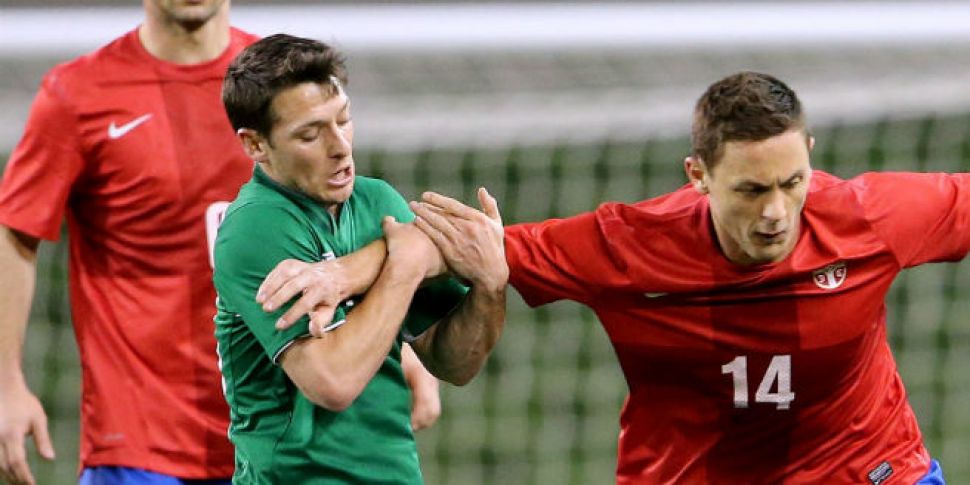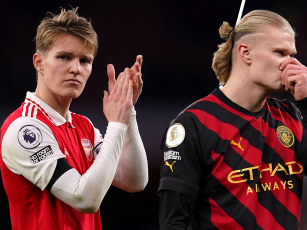In the time since Serbia last qualified for a major tournament, Ireland have been to two European Championships.
The 2010 World Cup, when they failed to advance from a group featuring Ghana, Australia and Germany, was Serbia's last appearance.
The qualification campaign for Euro 2016 was hindered by a debacle against eventual qualifiers Albania when a drone was flown into Belgrade's stadium, sparking a riot and ultimately leading to three deducted points.
"There have been lots of problems. In general, there's not been enough stability in coaching positions," says Serbian football writer and The Guardian contributor Igor Mladenovic of the issues in recent years when I spoke to him ahead of Monday's Serbia v Ireland clash in Belgrade.
It's not like they haven't had players who would be regarded highly like current captain Branislav Ivanovic and his Chelsea team-mate Nemanja Matic or Manchester City's Aleksandar Kolarov and Dusan Tadic of Southampton.
"The fact Serbia haven't qualified for the last three major tournaments is genuinely something illogical considering how good their players are. But the team has never been performing nearly as well as the individual players perform at their respective clubs. But it's because of the governance of the national team and because of how the coaches did their jobs. So they only have themselves to blame," Mladenovic adds.

Serbian national soccer team Branislav Ivanovic, left and Aleksandar Kolarov attend a training session in Belgrade, Serbia, Saturday, Sept. 6, 2014. Serbia will play an international friendly soccer match against France in Belgrade on Sunday, Sept. 7.(AP Photo/Darko Vojinovic)
But as he explains, Serbia like Ireland, are a small country which means there can be "imbalances" in terms of how the talent is spread around the squad, meaning some positions are stocked with outstanding or talented players while others are covered by less illustrious names.
Yet the future is bright in theory because this is a nation which has won the 2013 Under-21 UEFA European Championships and the FIFA Under-20 World Cup last year.
And that's no small feat because you've got to remember as mentioned already, that like us, Serbia are not a vastly populous nation.
An independent republic since 2006 after the break-up of the former Yugoslavia, the population is just 7 million.
"They did win the Under-20 FIFA World Cup last year so this is basically the young generations, the ones who won the under-19 European Championships in 2013. Among them there's Aleksandar Mitrovic (Newcastle), who will spearhead the attack against Ireland. So these are the two new generations which will constitute the backbone of this Serbian team for the qualification campaign," says Mladenovic.

Serbia's Aleksandar Mitrovic, left, fights for the ball with Portugal's Jose Fonte during the Euro 2016 Group I qualifying match between Serbia and Portugal, at the Partizan stadium in Belgrade, Serbia, Sunday, Oct. 11, 2015. (AP Photo/Darko Vojinovic)
Indeed, four of the squad that has been named to face Ireland are Under-20 World Cup winners, while the Under-21 Euros crop is also present.
Mladenovic points to winger Andrija Živković, who signed for Portuguese champions Benfica from Partizan Belgrade in July, as arguably the most exciting prospect from the Under-20 champions. Maccabi Tel Aviv's Predrag Rajković is another he sees as stepping in to fill the recent problem position of goalkeeper at senior level, while Liverpool's new midfield arrival Marko Grujić is another to get an honourable mention.
However, if you have followed Croatia's consistency in the last two decades, you will note that their major club Dinamo Zagreb are the main reason why that neighbouring nation continues to produce talent.
Serbia has capital clubs Partizan Belgrade and Red Star Belgrade. But Mladenovic draws a distinction when comparisons are made with Dinamo's ability to maintain a production line of Luka Modric among many others.
"Serbia still has a very, very good academy system but when it comes to translating that to club level, the aftermath of the war is still being felt," he explains, adding that clubs have tended to change presidents and leadership quite often which leads to a lack of continuity.
But as for the short-term of taking on Ireland and qualifying for the World Cup in Russia, he does see Serbia achieving qualification in part thanks to the astute and experienced 63-year-old new manager Slavoljub Muslin.
"I think he will be smart enough not to repeat the errors which were made in the past two campaigns," he says.
However, Mladenovic envisages a tight match against Ireland with Serbia being slight favourites by dint of being at home.
By 10pm on Monday, we will definitely know where Serbia and Ireland stand as they vie for qualification in an evenly-balanced group also featuring Wales and Austria.
Download the brand new OffTheBall App in the Play Store & App Store right now! We've got you covered!
Subscribe to OffTheBall's YouTube channel for more videos, like us on Facebook or follow us on Twitter for the latest sporting news and content.








